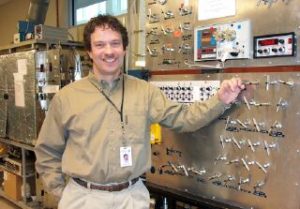Innovation Anthology #34: Director and Professor, Centre for Health Promotion

When it comes to getting oil out of the ground, producers usually revisit a well more than once.
That’s because primary production leaves 85 to 90 percent of the oil behind.
A process called flooding pumps water down a second well. And this pushes some more oil to the surface. But again, that still leaves about half the oil down below.
New technology developed by Dr. Fred Wassmuth at the Alberta Research Council promises to change that situation dramatically.
Using substances like acrylic acid and guar gum, Dr. Wassmuth has developed polymers that change the viscosity of water.
DR. FRED WASSMUTH:
We can make the water as thick as a thousand centipoids – so a thousand times more viscose than water. And then the water pours out of the beaker like molasses. We can go higher than that by changing the concentration, and make the water gelatinous.
This very thick water then acts like a piston hammering on the oil to push it out of the ground.
Dr. Fred Wassmuth is also testing polymers that will perform in the salty brines that oil fields produce. If successful, this will greatly reduce the need for using precious fresh water in enhanced oil recovery.
Thanks today to Alberta Research Council.
FOR INNOVATION ANTHOLOGY, I’M CHERYL CROUCHER
Guest
Kim Raine, PhD,
School of Public Health, University of Alberta, Edmonton, Alberta, Canada,
Sponsor
Alberta Research Council
Established as the first provincial research organization in Canada, the Alberta Research Council is 85 years old. The Alberta Research Council (ARC) develops and commercializes technologies to give customers a competitive advantage. A leader in innovation, ARC provides solutions globally to the energy, life sciences, agriculture, environment, forestry and manufacturing sectors.
ARC performs about five per cent of the roughly $1.5 billion in R&D done in Alberta each year, and generates revenues of approximately $84 million per year. ARC operates from five sites across the province in Edmonton, Calgary, Vegreville and Devon and employs more than 600 highly-skilled people.
In January 2010, under the new Alberta Innovation Framework, the Alberta Research Council was restructured and incorporated into the new provincial agency Alberta Innovates Technology Futures.

Program Date: 2007-05-24